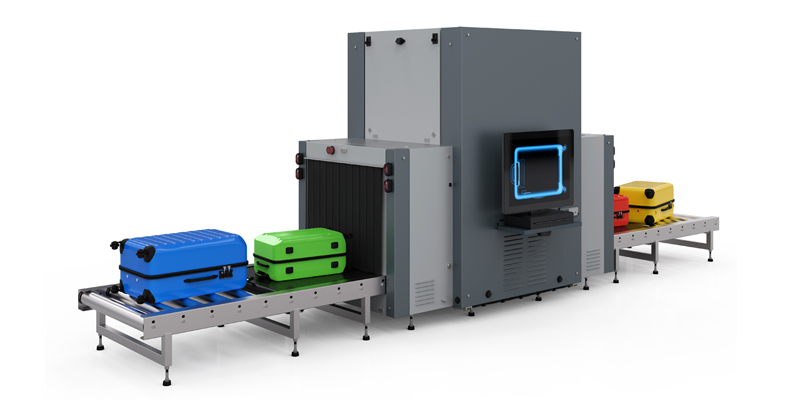Top 10 Benefits of X Ray Baggage Scanner for Safer & Security
An X Ray Baggage Scanner is a vital tool used globally to ensure the safety and security of public spaces like airports, government buildings, and commercial complexes. With increasing security threats and the need for efficient screening systems, these scanners play a crucial role in detecting prohibited and dangerous items hidden inside luggage or parcels.
Unlike traditional inspection methods, X Ray baggage scanners offer non-intrusive, fast, and highly accurate inspections. In countries like Bangladesh, the demand for these scanners has grown exponentially across sectors from aviation to shopping malls and event venues.

How X Ray Baggage Scanners Work
Basic Working Principle
The scanner emits low-dose X-ray beams through a conveyor-belt system carrying the baggage. These rays penetrate the items and generate high-resolution images based on material density and thickness.
Types of Imaging Techniques
-
Single-energy scanners create grayscale images.
-
Dual-energy scanners differentiate between organic, inorganic, and metallic materials using color-coding.
Dual-Energy vs. Single-Energy Scanners
Dual-energy models offer better threat detection and are preferred in high-security areas. Single-energy models, although cost-effective, may miss subtle threats.
Key Features of Modern Baggage Scanners
Real-Time Image Processing
Modern scanners provide real-time imaging with high-resolution displays, helping operators make fast and accurate decisions.
Automatic Threat Detection
AI-powered software can auto-flag knives, guns, explosives, and contraband items without human intervention.
Material Discrimination
Different colors highlight materials: organic (orange), inorganic (green), and metals (blue), allowing better object identification.
Size and Tunnel Dimensions
Scanners come in various sizes to accommodate small parcels to large suitcases. Standard tunnel sizes include 5030, 6550, and 10080 models.
Benefits of Using X Ray Baggage Scanners
Enhanced Security & Safety
The primary benefit is security. Detecting hidden weapons, explosives, or contraband helps prevent crime and terrorism.
Faster Luggage Processing
These machines scan hundreds of bags per hour, ensuring a quick screening process and minimal passenger delays.
Cost Efficiency in the Long Run
Despite high initial costs, they reduce labor expenses, prevent theft, and avoid legal liabilities—saving money in the long run.
Compliance with Global Safety Standards
Modern baggage scanners comply with international norms such as ISO, CE, and FAA regulations.
Applications of Baggage Scanners
-
Airports & Seaports: Screening luggage and cargo
-
Government Facilities: Ensuring staff and visitor safety
-
Shopping Malls & Event Venues: Preventing threats in high-traffic zones
-
Industrial Warehouses: Monitoring incoming and outgoing goods
Choosing the Right Luggage Scanner
Scanner Size & Throughput Capacity
Larger facilities require scanners with high throughput and larger tunnel sizes.
Software & Interface Features
Touchscreen displays, remote access, and multilingual support enhance usability.
Maintenance & Durability
Scanners with fewer moving parts and self-diagnostic features ensure lower maintenance costs.
Baggage Scanner vs. Hand Inspection
|
Feature |
Baggage Scanner |
Manual Inspection |
|
Speed |
High |
Slow |
|
Accuracy |
Consistent |
Human-error prone |
|
Safety |
Non-contact |
Physical contact |
|
Cost |
High upfront, low recurring |
High recurring costs |
Latest Innovations in X Ray Scanning Technology
-
AI Integration: Automatic image analysis
-
3D Imaging: More accurate object depth analysis
-
Remote Monitoring: Centralized cloud-based system access
Installation & Operation Tips
Ensure the site has:
-
Adequate space and power supply
-
Trained operators
-
Proper ventilation
Frequent calibration and firmware updates are vital for optimal performance.
Legal and Compliance Considerations
Follow Bangladesh Atomic Energy Commission (BAEC) guidelines for radiation exposure limits. Also, ensure image storage complies with data protection laws.
Common Myths About X Ray Baggage Scanners
-
Health Risks: Radiation is minimal and shielded.
-
Detection Limits: Advanced models detect liquids, powders, and electronics.
Best Baggage Scanner Price in Bangladesh
In 2025, the price of X Ray baggage scanners in Bangladesh typically ranges from ৳8,00,000 to ৳45,00,000, depending on the Baggage Scanner Brands, Features, Tunnel Size and Modern Technology.
Market Overview in 2025
Prices vary based on:
-
Tunnel size (5030 vs. 10080)
-
Features (AI, dual-energy)
-
Brand reputation
Top Brands Available
-
VARITO
-
Astrophysics
-
Smiths Detection
- Safeway System
Where to Buy the Best Luggage Scanner in Bangladesh
Authorized Dealers & Distributors
Choose certified dealers for warranty and installation support.
Online vs. Offline Shopping
While online platforms offer variety, offline showrooms allow product demos.
Warranty and After-Sales Support
Check for at least 1-year warranty and prompt technical support availability.
Conclusion: Investing in Security with X Ray Baggage Scanners
A high-quality X Ray Baggage Scanner is a smart investment in any facility prioritizing security and operational efficiency. With advancements in imaging technology, AI, and safety compliance, these scanners have become more accessible and vital than ever — especially in growing markets like Bangladesh.
Whether you're looking for the best baggage scanner price in Bangladesh or need guidance on installation and usage, the key is choosing a model that aligns with your security needs and operational volume.
FAQs About X Ray Baggage Scanner
Q1. Is it safe for passengers to pass through an X Ray baggage scanner?
A: Yes, these scanners are designed to scan luggage, not people. They emit safe, regulated levels of radiation.
Q2. Can these scanners detect liquids or hidden electronics?
A: Absolutely. Advanced models can identify liquids, powders, and electronic components using material discrimination.
Q3. How often should the scanners be maintained?
A: Ideally every 6-12 months, depending on usage and model specifications.
Q4. Are these scanners approved by international authorities?
A: Most reputable brands comply with CE, ISO, and FAA guidelines for global deployment.
Q5. What is the average life expectancy of a baggage scanner?
A: With proper maintenance, scanners last 7 to 10 years or more.
Q6. Can I integrate this scanner with CCTV and other security systems?
A: Yes, modern scanners support API and remote integration with surveillance and alert systems.
